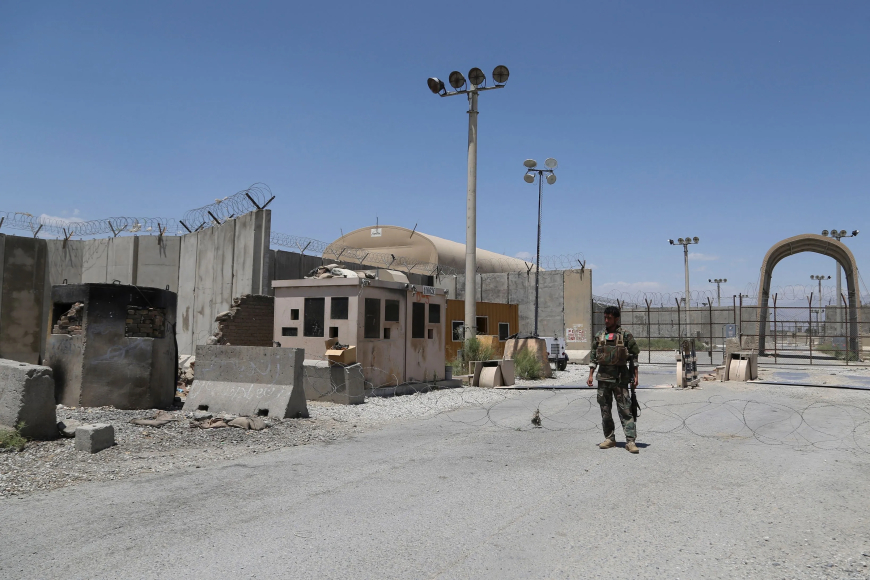Trump Says U.S. Working to Get Bagram Airbase ‘Back’ from Taliban, Cites China Nuclear Proximity
President Trump said the U.S. is working to regain Bagram Airbase from the Taliban, calling it critical due to its proximity to China’s nuclear weapons facilities.

Washington, D.C. – President Donald Trump said this week that the United States is working to regain control of Bagram Airbase in Afghanistan, a facility that has been under Taliban control since the American withdrawal in 2021. Trump described the airfield as a “strategic necessity,” emphasizing its proximity to China’s nuclear facilities and calling its loss a “historic mistake” by the previous administration.
Trump Calls Bagram “Key to U.S. Security”
Speaking during a national security briefing at the White House, Trump declared that Bagram Airbase is “vital to U.S. interests in the region.” He stressed that the base’s location — “an hour away from where China makes its nuclear weapons,” as he put it — makes it essential for monitoring both Chinese and regional military activity.
“Bagram should have never been given up. It was the most powerful airbase in the world, and we are now actively working on getting it back,” Trump said. “We’re not just talking about Afghanistan, we’re talking about a position right next to China, Iran, and Russia. It’s one of the most critical spots on earth.”
A Base with Long History
Bagram Airfield, located north of Kabul, served as the largest U.S. military base in Afghanistan during the 20-year war. It housed tens of thousands of troops at its peak, along with advanced surveillance and drone operations.
After the U.S. withdrawal in August 2021, the Taliban swiftly seized the facility. Since then, reports suggest that China and Russia have shown interest in its strategic value, although Beijing has officially denied any military presence there.
“Control of Bagram represents leverage over Central and South Asia,” said Michael O’Hanlon, a defense analyst at the Brookings Institution. “Its proximity to western China makes it uniquely valuable, especially for intelligence and surveillance purposes.”
Tying It to China’s Nuclear Ambitions
Trump’s remark about Bagram being “an hour away” from Chinese nuclear sites underscores the broader context of U.S.-China tensions. Western intelligence agencies have tracked China’s nuclear build-up in Xinjiang and surrounding regions, raising concerns in Washington about Beijing’s long-term ambitions.
“Having Bagram would give the U.S. far greater capacity to monitor China’s weapons development,” said retired General Jack Keane. “It’s not just about Afghanistan. It’s about global power competition.”
Diplomatic and Military Challenges
Reclaiming Bagram is easier said than done. The Taliban currently control the base, and any U.S. attempt to retake it would likely involve either direct negotiations with the group or a significant military operation.
Secretary of Defense Lloyd Austin confirmed that “options are being evaluated,” but declined to provide specifics. “The President has directed us to review all possible avenues for restoring U.S. presence at Bagram in a way that serves long-term security interests,” Austin said.
Analysts note that negotiations with the Taliban could face significant hurdles, given the group’s strained relationship with Washington. The Taliban’s ties with regional players like Pakistan and potential alignment with Beijing further complicate the picture.
Republican Praise, Democratic Skepticism
Republicans in Congress quickly backed Trump’s comments, framing the possible return to Bagram as a step toward undoing what they call the “catastrophic withdrawal” of 2021.
“Losing Bagram was one of the biggest strategic mistakes in modern history,” said Sen. Lindsey Graham (R-SC). “President Trump is right to make it a priority to get it back.”
Democrats, however, questioned the practicality of such a move. Sen. Chris Murphy (D-CT) cautioned, “We cannot just march back into Afghanistan without risking another endless war. There must be a clear strategy and achievable objectives.”
A Broader Security Realignment
Trump’s renewed focus on Afghanistan fits into a larger shift in U.S. foreign policy under his second term. The administration has prioritized countering China’s rise and reasserting American influence in regions where Beijing is expanding its reach.
In addition to Afghanistan, Trump has pushed for stronger security ties with India and Central Asian nations to contain Chinese influence. Analysts say regaining Bagram would symbolize a dramatic reversal of America’s post-2021 disengagement.
“The message is clear: the U.S. is back in the game in Central Asia,” said O’Hanlon. “Re-establishing Bagram would be a bold signal to China, Russia, and the Taliban that America intends to stay.”
Public Opinion and Military Families
Among veterans and military families, Trump’s comments struck a chord. Many service members who deployed to Bagram view the base as a symbol of U.S. sacrifice and capability.
“I lost friends there. To see it in Taliban hands is heartbreaking,” said Mark Daniels, a former Army sergeant who served at Bagram in 2012. “If we can take it back and use it to keep America safe, then we should.”
Public opinion remains divided, however, with war-weary Americans wary of another prolonged engagement in Afghanistan. Recent polls show strong support for keeping U.S. focus on domestic priorities rather than overseas conflicts.
What Comes Next
Officials say the administration is considering multiple scenarios, including covert agreements with regional partners, expanded intelligence sharing, or direct talks with the Taliban. Military experts caution that any operation to retake Bagram would be complex and could risk destabilizing fragile regional balances.
Still, Trump’s words leave little doubt that the base is now back at the center of U.S. strategic thinking.
“America made a mistake in leaving Bagram,” Trump said in closing. “We’re going to correct that mistake, one way or another.”
What's Your Reaction?
 Like
0
Like
0
 Dislike
0
Dislike
0
 Love
0
Love
0
 Funny
0
Funny
0
 Angry
0
Angry
0
 Sad
0
Sad
0
 Wow
0
Wow
0







































